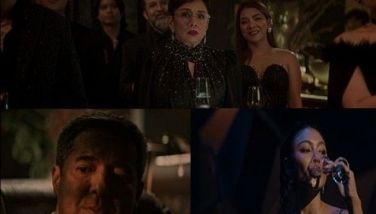The twilight of his years
September 26, 2004 | 12:00am
At a glance, About Schmidt may be dismissed as a story for people in the twilight of their years. After all, it is a movie about the after-retirement days of a 66-year-old man — his anxieties about the future, frustrations about being old and unappreciated, surviving the death of a spouse, loneliness, and coping with them all. But then again, people in their prime, and those in the threshold of their prime, may very well have more to gain with the insights in this story and save a lot of mis-spent energies in their journey through life. To me, this movie is about one of the most asked question in life: What is it all about?
The story starts with the main character’s retirement day in Omaha, Nebraska, USA. His office all packed up of his personal belongings, and his official papers in boxes, Warren Schmidt (played by Jack Nicholson) quietly waits for the clock to strike 5. He picks up his wife of 42 years, Helen (played by June Sqibb), and they go to his retirement party. His replacement, a much younger man in his prime and obviously excited about his new important position at one of the country’s premiere insurance company, extols Schmidt’s achievements for the company and offers a toast to his retirement days. Then follows Schmidt’s long-time friend and colleague in the company who retired ahead of him. Seemingly, the oration ventures to answer our question. The friend goes: "…the gifts, the dinner, social security, the pension… all these superficiality don’t mean a … thing….what matters is having dedicated one’s life to something meaningful, being productive, helping build a company…, raising a fine family, being respected by your community, making wonderful lasting friendships… at the end of a man’s career, he can look back and say: I did it!... I did my job… and he can retire in glory and riches far beyond the monetary kind…" In turn, I venture to ask: All these things that are supposed to matter, do they really? After all, what unfolds in the movie put forth more questions than support the theory that they do.
Schmidt narrates and mostly explains himself and what he did in his life through his letters to an orphan who he decides to support financially about 10 minutes into the movie. With no office to go to anymore, he watches television on his first day of retirement and sees an ad asking for help for orphaned children in Tanzania. He calls in to pledge the monthly stipend of a scant $22. He quickly gets a grateful response from the organizers of the charity work, and an invitation to regularly write to his six-year old beneficiary, Ndugo.
Schmidt’s first letter to Ndugo shows his frustration. He tells Ndugo about himself — about how he just retired and his rage at his replacement and the company. This was the same company he had poured all his productive life on, and which apparently did not value his work. He found all his files, including all his reports and studies for the company, dumped in the company garage when he visited after his last day in office. As audience, we ask ourselves then, do the things we do "for work" really matter? Or can somebody else, or anybody else, just as easily do the job in another way, at another time?
In the same letter, Schmidt also tells Ndugo about Helen and their daughter, Jeannie (played by Hope Davis). Schmidt writes about how little things about his wife have been irritating him for some time. He writes about how they seldom see their only child now that she’s all grown up and living her own life in Denver, and about to get married herself. He reminisces about how in his youth he had wanted to be somebody "important," and about how having a wife and daughter to support precluded him from taking risks that would have been necessary to be a cut above everyone else. Instead, he chose a steady career in insurance. Nobody had a clue all these things – the frustrations, resentment and regret, had been running through Warren’s mind. He was pleasant to his wife, and polite to everyone else. He did his job well. Smiling and saying the right things, a toast of the community. Most of us tend to go through our lives this way – a life that is expected, with all its conventions. To deviate is tantamount to inviting disdain and being called a failure. A person gets a job after graduating from school, start a career, get married, buy a house, bring up children, stay employed to provide for the family, then retire, and say "I did it… I did my job." At retirement, one is expected to be happy and content.
Then, Helen suddenly dies. Warren’s angst in life is replaced by the shock of coming home to find his wife slumped on the floor. How he copes with this unexpected development, showed he had not anticipated living a life without his irritating wife. He writes to Ndugo: "Appreciate what you have while you have it." Although cope, our character did, the subtle question remains: In our struggles in life, what does it really matter if we’re all just going to die anyway?
Now our hero is really alone. Not the "alone-in-the-midst-of-a-crowd" kind where a person can be surrounded by family and friends who have no idea what he really thinks or feels inside, and only see the surface of what they want to see. He is alone to face finding out the betrayal of a long-time friend. Yes, the same one who first ventured to answer our all-time important question. Apparently, this friend had something going on with his wife 25 years or so before. Warren found the love letters in his wife’s things one night when he was rummaging through her belongings hoping to feel her presence and ease his loneliness.
Half-crazy, Schmidt embarks on the road trip on their new camper-house Helen had been planning to take to attend the wedding of Jeannie. He had been disapproving of the match. Now that Helen is not around to dissuade him from doing so, he was determined to persuade his daughter not to push through with the wedding. He did not want her to live a life of regret and marry an irresponsible underachiever.
He arrives in Denver. In the confusion that attends most wedding preparations, Schmidt had to deal with his unconventional future in-laws. He gritted his teeth while he witnessed the weaknesses of his future son-in-law (played by Dermot Mulroney) and his dysfunctional family. Only Jeannie knew of his disapproval, and she showed as much resentment as Schmidt had inside of him in the beginning of the story. She did not appreciate his well-meaning gesture of showing his concern for her choice of partner. In the end, Schmidt remained gritting his teeth and performed as expected at the night of the wedding.
On the way back, he passes through a museum featuring the pioneers in the country who had to go through so much hardship to settle in an undeveloped territory. Dejected, he reflects on how small he seems in the scheme of things. Those early settlers made a difference, and paved the way for the birth of a great country that America is today. He asks himself: What in the world is different because of me?
He arrives home, not less dejected. He failed to save his daughter who did not want to be saved by him. Jeannie is married to the wrong guy. He is weak… a failure. He thinks to himself he will die soon, as will those who knew him. Then it will be as if he never even existed.
He picks up the mail that accumulated in his absence. An envelope from the bunch catches his attention. It was from Ndugo’s caretakers. The nun in-charge of Ndugo wrote to thank him and tell him how Ndugo has been well and receiving proper care because of his monthly check. Ndugo could not read or write yet, so he made a painting, instead, especially for Warren. It was a stick painting of a child held in the hand by an adult with the sun shining bright in the back-drop. Schmidt starts to cry, sobs, then smiles through the tears. The story ends.
Warren Schmidt got his answer. So did I.
The story starts with the main character’s retirement day in Omaha, Nebraska, USA. His office all packed up of his personal belongings, and his official papers in boxes, Warren Schmidt (played by Jack Nicholson) quietly waits for the clock to strike 5. He picks up his wife of 42 years, Helen (played by June Sqibb), and they go to his retirement party. His replacement, a much younger man in his prime and obviously excited about his new important position at one of the country’s premiere insurance company, extols Schmidt’s achievements for the company and offers a toast to his retirement days. Then follows Schmidt’s long-time friend and colleague in the company who retired ahead of him. Seemingly, the oration ventures to answer our question. The friend goes: "…the gifts, the dinner, social security, the pension… all these superficiality don’t mean a … thing….what matters is having dedicated one’s life to something meaningful, being productive, helping build a company…, raising a fine family, being respected by your community, making wonderful lasting friendships… at the end of a man’s career, he can look back and say: I did it!... I did my job… and he can retire in glory and riches far beyond the monetary kind…" In turn, I venture to ask: All these things that are supposed to matter, do they really? After all, what unfolds in the movie put forth more questions than support the theory that they do.
Schmidt narrates and mostly explains himself and what he did in his life through his letters to an orphan who he decides to support financially about 10 minutes into the movie. With no office to go to anymore, he watches television on his first day of retirement and sees an ad asking for help for orphaned children in Tanzania. He calls in to pledge the monthly stipend of a scant $22. He quickly gets a grateful response from the organizers of the charity work, and an invitation to regularly write to his six-year old beneficiary, Ndugo.
Schmidt’s first letter to Ndugo shows his frustration. He tells Ndugo about himself — about how he just retired and his rage at his replacement and the company. This was the same company he had poured all his productive life on, and which apparently did not value his work. He found all his files, including all his reports and studies for the company, dumped in the company garage when he visited after his last day in office. As audience, we ask ourselves then, do the things we do "for work" really matter? Or can somebody else, or anybody else, just as easily do the job in another way, at another time?
In the same letter, Schmidt also tells Ndugo about Helen and their daughter, Jeannie (played by Hope Davis). Schmidt writes about how little things about his wife have been irritating him for some time. He writes about how they seldom see their only child now that she’s all grown up and living her own life in Denver, and about to get married herself. He reminisces about how in his youth he had wanted to be somebody "important," and about how having a wife and daughter to support precluded him from taking risks that would have been necessary to be a cut above everyone else. Instead, he chose a steady career in insurance. Nobody had a clue all these things – the frustrations, resentment and regret, had been running through Warren’s mind. He was pleasant to his wife, and polite to everyone else. He did his job well. Smiling and saying the right things, a toast of the community. Most of us tend to go through our lives this way – a life that is expected, with all its conventions. To deviate is tantamount to inviting disdain and being called a failure. A person gets a job after graduating from school, start a career, get married, buy a house, bring up children, stay employed to provide for the family, then retire, and say "I did it… I did my job." At retirement, one is expected to be happy and content.
Then, Helen suddenly dies. Warren’s angst in life is replaced by the shock of coming home to find his wife slumped on the floor. How he copes with this unexpected development, showed he had not anticipated living a life without his irritating wife. He writes to Ndugo: "Appreciate what you have while you have it." Although cope, our character did, the subtle question remains: In our struggles in life, what does it really matter if we’re all just going to die anyway?
Now our hero is really alone. Not the "alone-in-the-midst-of-a-crowd" kind where a person can be surrounded by family and friends who have no idea what he really thinks or feels inside, and only see the surface of what they want to see. He is alone to face finding out the betrayal of a long-time friend. Yes, the same one who first ventured to answer our all-time important question. Apparently, this friend had something going on with his wife 25 years or so before. Warren found the love letters in his wife’s things one night when he was rummaging through her belongings hoping to feel her presence and ease his loneliness.
Half-crazy, Schmidt embarks on the road trip on their new camper-house Helen had been planning to take to attend the wedding of Jeannie. He had been disapproving of the match. Now that Helen is not around to dissuade him from doing so, he was determined to persuade his daughter not to push through with the wedding. He did not want her to live a life of regret and marry an irresponsible underachiever.
He arrives in Denver. In the confusion that attends most wedding preparations, Schmidt had to deal with his unconventional future in-laws. He gritted his teeth while he witnessed the weaknesses of his future son-in-law (played by Dermot Mulroney) and his dysfunctional family. Only Jeannie knew of his disapproval, and she showed as much resentment as Schmidt had inside of him in the beginning of the story. She did not appreciate his well-meaning gesture of showing his concern for her choice of partner. In the end, Schmidt remained gritting his teeth and performed as expected at the night of the wedding.
On the way back, he passes through a museum featuring the pioneers in the country who had to go through so much hardship to settle in an undeveloped territory. Dejected, he reflects on how small he seems in the scheme of things. Those early settlers made a difference, and paved the way for the birth of a great country that America is today. He asks himself: What in the world is different because of me?
He arrives home, not less dejected. He failed to save his daughter who did not want to be saved by him. Jeannie is married to the wrong guy. He is weak… a failure. He thinks to himself he will die soon, as will those who knew him. Then it will be as if he never even existed.
He picks up the mail that accumulated in his absence. An envelope from the bunch catches his attention. It was from Ndugo’s caretakers. The nun in-charge of Ndugo wrote to thank him and tell him how Ndugo has been well and receiving proper care because of his monthly check. Ndugo could not read or write yet, so he made a painting, instead, especially for Warren. It was a stick painting of a child held in the hand by an adult with the sun shining bright in the back-drop. Schmidt starts to cry, sobs, then smiles through the tears. The story ends.
Warren Schmidt got his answer. So did I.
BrandSpace Articles
<
>
- Latest
- Trending
Trending
Latest
Trending
Latest
Recommended

































